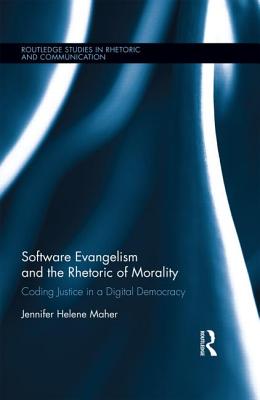
Areas of Interest: Rhetoric, Software Studies, and Technical Communication
Contact Information
Email: jmaher@umbc.edu
Office: PAHB 401
Office Number: 410-455-2040
Education
Ph.D. in Rhetoric and Professional Communication, Iowa State University
M.A. in English, Miami University
B.A. in Latin and Classics, Miami University
Biography
Jennifer Maher is an associate professor in the English department’s Communication & Technology Track and an affiliate faculty member in the Language, Literacy, and Culture Ph.D. program. She currently serves as English Department Chair. Her research interests include rhetorics of technology, the discipline of Rhetoric and Composition, and the city of Baltimore.
She is the author of Software Evangelism and the Rhetoric of Morality (2015), which analyzes the politics of good code in software development. Her most recent work includes an exploration of the rhetoric of health and medicine as social justice in “Challenging Racial Disparities in and through Public Health Campaigns,” and she is currently working on a book on infrastructure rhetorics, which developed out of her class on Baltimore.
In addition to serving on the editorial board for Technical Communication Quarterly, she is a co-developer of the open-access Miami Writing Institute, which shares disciplinary-based knowledge about writing and rhetoric.
Representative Publications
Olejnik, Mandy, Elizabeth Wardle, Jennifer Helene Maher, Will Chesher, and Angela Glotfelter. “Working with Faculty Partners to Change Conceptions of Writing beyond University Walls.” WAC Journal, vol. 33, 2023, pp. 7-31.
“Challenging Racial Disparities in and through Public Health Campaigns.” In Rhetoric of Health and Medicine As/Is, edited by Lisa Meloncon, Scott Graham, Jenell Johnson, John Lynch, and Cynthia Ryan, Ohio State University Press, 2020, pp. 182-206.
Rhetoric as Persistently ‘Troublesome Knowledge’: Implications for Disciplinarity.” In (Re)Considering What We Know: Threshold Concepts of Writing Studies, edited by Linda Adler-Kassner and Elizabeth Wardle, Utah State University Press/University Press of Colorado. 2019, pp. 94-112.
Maher, Jennifer Helene, Helen Burgess, and Tim Menzies. “Good Computing with Big Data.” In Rhetorical Machines: Past, Present, and Future Conversations in Rhetoric and Composition, edited by John Jones and Lavinia Hirsu, University of Alabama Press, 2019, pp. 190-211.
“Women’s Hacking and the Poison Gift of Free/Libre and Open-Source Software.” In Making Our World: Hacker and Maker Movements in Context, edited by Andrew Schrock and Jeremy Hunsinger, Peter Lang, 2019, pp. 171-96.
“Good AI Computing Well.” The Sweetland Digital Rhetoric Collaborative for Blog Carnival on Rhetoric and Ethics in Smart Technologies and Artificial Intelligence. University of Michigan. 2018. (Awarded Editor’s Choice by Digital Humanities Now for “scholarship that drives the field of digital humanities forward.)
“Artificial Rhetorical Agents and the Computing of Phronesis.” Computational Culture: A Journal of Software Studies. Special issue on Rhetoric and Computation, vol. 5, 2016.
Books

Software Evangelism and the Rhetoric of Morality: Coding Justice in a Digital Democracy
Routledge, 2015
This study examines the layers of meaning encoded in code and the rhetoric surrounding it. In software development culture, evangelism typically denotes a rhetorical practice that aims to convert software developers, as well as non-technical lay users, from one platform to another. Maher argues that software evangelism, like its religious counterpart, must also be understood as constructing moral and political values that extend well beyond the boundaries of development culture.